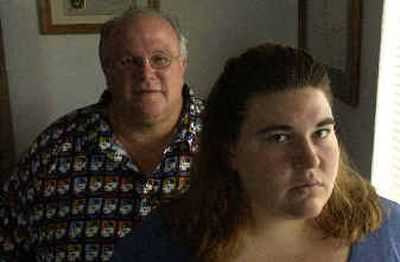Southwest sued over weight issue

A Chattaroy woman has sued Southwest Airlines, saying employees of the company humiliated her in front of other passengers because of her weight.
Trina Blake, 26, said the treatment she received just before boarding a return flight to Spokane from Orlando, Fla., has left her distraught and afraid to go out in public.
In May 2003, Blake, her husband and three young children were returning from a visit to see her mother, who lives in Orlando.
Before boarding the Southwest flight that would take her to Seattle, Blake said a Southwest gate agent made repeated suggestions that she was too large to fit easily into a single seat.
According to Blake, after keeping her aside in the boarding area for extended questioning about her weight, the gate agent then escorted her onto the aircraft. The agent, Blake said, told flight attendants to watch Blake and make sure she didn’t take up more than one seat.
“I was told that if I even lifted the armrest (between seats), I’d be charged for a second ticket at the next airport,” Blake said in an interview.
The gate agent repeated that warning to the flight crew loudly enough that nearby passengers were watching her and listening, adding to her discomfort, Blake said.
Southwest Airlines, one of the few profitable airlines in the country, has a policy of requiring second tickets for people of large girth. Some other U.S. airlines have similar policies, said Linda Rutherford, director of media relations for Dallas-based Southwest.
Rutherford said the policy used by Southwest is not discriminatory and is meant to ensure passenger safety and comfort – for the large passenger and those nearby. In 2000, a California court ruled that Southwest did not violate a passenger’s civil rights by requesting a second fare when deemed necessary. Federal aviation authorities have also suggested that airlines carefully monitor the size of their passengers to ensure plane safety, but they have not laid out specific rules to follow.
Blake said she’s flown numerous times before on Southwest and other airlines and never had been asked to consider buying an extra seat.
Further, she said she wouldn’t have considered it discrimination in this case if Southwest had been more discreet and polite in asking her to consider a second seat. But in her view, the treatment she received was abusive and insulting, she said.
Spokane attorney Curtis Shoemaker, who has been hired to defend Southwest, said the airline denies it discriminated against or harassed Blake.
Blake’s attorney, Russell Van Camp, filed the action in Spokane’s U.S. District Court in June. He said he plans to seek unspecified monetary damages for reckless infliction of emotional distress and harassment.
At the least, Blake said, she’d like to receive a formal apology from the airline. She wrote a letter after the incident and received two $50 Southwest vouchers, which have gone unused, she said. The letter she received did not include an apology, Blake said.
“Even if they offered me free tickets for the rest of my life, it would do me no good,” she said. “I’m not able to fly anymore. The idea of flying again gives me too much anxiety.”
Blake said the emotional impact of the incident started during the flight back to Seattle. During that trip, she sat frozen in her seat, afraid to get up or move the armrest. “I was very uncomfortable and spent most of the time crying,” she said. One Southwest flight attendant came over and offered her words of comfort, Blake added.
Blake said she didn’t decide to file a lawsuit until several weeks after the Orlando episode. She said she’s normally “a people person,” but since that trip has been more withdrawn and tends to stay home. She added that she’s now more paranoid. “I go out to a restaurant and I’m always listening, trying to hear what people are saying about me.”
A year ago, she called several local attorneys to talk about possibly filing suit against Southwest, finally visiting the office of Van Camp – himself a large man who frequently files lawsuits on behalf of people with injuries or those who claim to be victims of discrimination.
“They’ve never, ever dared to treat me that way,” said Van Camp about Southwest Airlines and other airlines he’s flown on. “So I find it strange that they’re totally inconsistent, picking on a young mother and making her feel humiliated.”
Southwest spokeswoman Rutherford said the airline requests a second seat “very rarely.” She said the airline doesn’t track the frequency of that request.
“More often it’s the case that some passengers pre-order two seats before coming to the airport. They’ve already addressed the need for two seats.” And in cases where a passenger is asked to buy a second ticket, the fare will be refunded if the plane leaves with any unfilled seats, she said.
She said the airline is working harder to ensure that employees are consistent in asking passengers to consider two seats, so that passengers like Blake don’t go across the country and then encounter a request on a return trip. She also defended the Southwest requirement that armrests remain down. “That’s a good indicator of whether or not a passenger may be encroaching on the next seat,” Rutherford said.
“This is a very sensitive issue and we handle it with the utmost discretion,” she added.
Not all airlines, however, make pointed requests of large passengers to buy an extra seat. Jeff Green, a spokesman for Chicago-based United Airlines, said his company has no formal policy, but asks passengers in certain cases “if they would be comfortable with two seats.” The airline advises those passengers they may feel better with two seats “but we will not require them to do that,” Green said.